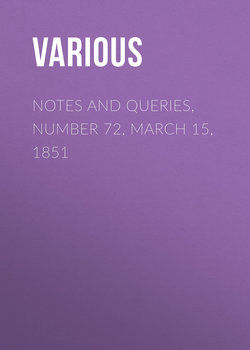Читать книгу Notes and Queries, Number 72, March 15, 1851 - Various - Страница 4
Notes
GLOUCESTERSHIRE PROVINCIALISMS
ОглавлениеTo burl, burling; to shunt, &c.—In the report of the evidence regarding the death of Mrs. Hathway, at Chipping Sodbury, supposed to have been poisoned by her husband, the following dialectical expression occurs, which may deserve notice. One of the witnesses stated that he was invited by Mr. Hathway to go with him into a beer-house in Frampton Cotterell, "and have a tip," but he declined.
"Mr. H. went in and called for a quart of beer, and then came out again, and I went in. He told me 'to burl out the beer, as he was in a hurry;' and I 'burled' out a glass and gave it to him."—Times, Feb. 28.
I am not aware that the use of this verb, as a provincialism, has been noticed; it is not so given by Boucher, Holloway, or Halliwell. In the Cumberland dialect, a birler, or burler, is the master of the revels, who presides over the feast at a Cumberland bidden-wedding, and takes especial care that the drink be plentifully provided. (Westmoreland and Cumberland Dialects, London, 1839.)
Boucher and Jamieson have collected much regarding the obsolete use of the verb to birle, to carouse, to pour out liquor. See also Mr. Dyce's notes on Elynour Rummyng, v. 269. (Skelton's Works, vol. ii. p. 167.). It is a good old Anglo-Saxon word—byrlian, propinare, haurire. In the Wycliffite versions it occurs repeatedly, signifying to give to drink. See the Glossary to the valuable edition lately completed by Sir F. Madden and Mr. Forshall.
In the Promptorium Parvulorum, vol i. p. 51., we find—
"Bryllare of drynke, or schenkare: Bryllyn, or schenk drynke, propino: Bryllynge of drynke," &c.
Whilst on the subject of dialectical expressions, I would mention an obsolete term which has by some singular chance recently been revived, and is actually in daily use throughout England in the railway vocabulary—I mean the verb "to shunt." Nothing is more common than to see announced, that at a certain station the parliamentary "shunts" to let the Express pass; or to hear the order—"shunt that truck," push it aside, off the main line. In the curious ballad put forth in 1550, called "John Nobody" (Strype's Life of Cranmer, App. p. 138.), in derision of the Reformed church, the writer describes how, hearing the sound of a "synagogue," namely, a congregation of the new faith, he hid himself in alarm:
"The I drew me down into a dale, wheras the dumb deer
Did shiver for a shower, but I shunted from a freyke,
For I would no wight in this world wist who I were."
In the Townley Mysteries, Ascensio Domini, p. 303., the Virgin Mary calls upon St. John to protect her against the Jews,—
"Mi fleshe it qwakes, as lefe on lynde,
To shontt the shrowres sharper than thorne,"—
explained in the Glossary, "sconce or ward off." Sewel, in his English and Dutch Dictionary, 1766, gives—"to shunt (a country word for to shove), schuiven." I do not find "shunt," however, in the Provincial Glossaries: in some parts of the south, "to shun" is used in this sense. Thus, in an assault case at Reigate, I heard the complainant say of a man who had hustled him, "He kept shunning me along: sometimes he shunt me on the road," that is, pushed me off the footpath on to the highway.
I hope that the Philological Society has not abandoned their project of compiling a complete Provincial Glossary: the difficulties of such an undertaking might be materially aided through the medium of "Notes and Queries."
Albert Way.
